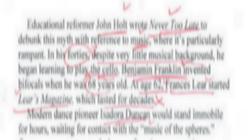| |
How Writers Can Cash in as Experts
by Marcia Yudkin
Savvy freelancers know that they can re-sell articles and re-target their research to multiply their payoff from each assignment they undertake. Fewer take advantage of opportunities to cash in on their expertise outside of the realm of writing articles and books. Yet practically anyone who has successfully gathered information and sold it in written form can manage to get paid for his or her skills and knowledge by parties outside of publishing.
|
Often paying significantly more than pure writing gigs, sidelining as a consultant, speaker or expert witness begins with the understanding that what you know can have value for people besides those with whom you primarily do business.
Research skills you've developed writing articles can earn you extra income from companies that need specific information fast, for instance. Baltimore medical and science writer Bruce Goldfarb has discovered that pharmaceutical advertising agencies are willing to shell out top dollar for his ability to synthesize quickly what he can turn up in a Medline search.
"They have a client who sells a clot-busting drug and they want to understand the typical treatment for a heart attack. Or they want to know which antibiotics are most problematic for causing resistance. I charge an hourly rate, and since these guys want quick answers I can charge a premium," Goldfarb says.
|
|
Published! How to
Reach Writing Success
|
|
"I can give them a down-and-dirty summary on virtually any drug or disease within 24-48 hours, so they can get up to speed and walk into a meeting without sounding like a complete
idiot," he adds.
While Goldfarb hasn't promoted this sort of work aggressively, it has come to him just from including it on his resume or in a sentence or two of a cover letter to people in the health care industry. "Word has gotten around and now I'm apparently on the Rolodex at several agencies," he says. "I'm primarily a writer, but I've discovered that there are information brokering associations and books on the topic. It's a whole profession, with some brokers specializing in various areas
- finance, international trade, whatever."
|
Become a Successful Freelance
Writer - Start Today!
Slash your learning curve by completing nine
article idea generation and writing assignments
and gaining feedback from a Book-of-the-Month Club
author who has published in the New York Times
Magazine, Business
2.0, Psychology Today, USAirways, TWA Ambassador
and many other top publications. Magazine
writing course for beginners. |
Besides your expertise in research, as an experienced journalist you would have your knowledge of the way writers and publications think and work to capitalize on. Freelance writer Tim Harper of Ridgewood, New Jersey, got hired to go into a public relations firm and tell the younger publicists what journalists want and need.
Harper has also reeled in fees for advising a British publisher interested in promoting projects at a book fair in the United States. "He wanted my ideas on how these would go over in the American market, and I talked about what trends were in education and kids' libraries pretty much off the top of my head. He's also sent me proposals or pitch materials that I've gone through and Americanized."
Similarly, gardening writer Barbara Pleasant says that numerous horticulture writers get hired as "spin doctors" by companies that manufacture lawn grass seed and lawn care products to point out angles on products that the companies might not have thought of. Consulting work on promotions also comes to horticulture writers from ad agencies and organizations like the Canadian Peat Moss Association, she says. Even if you haven't ever written press releases and have no particular specialty, you're equipped to handle this sort of brainstorming and idea generation if you have experience concocting creative and non-obvious article angles as a journalist.
My version of capitalizing on my general experience as a writer has been setting myself up as a writing coach for individuals trying to get published or wanting detailed feedback on their work. I'm constantly surprised how few seasoned writers go after this kind of work. While many aspiring writers can't afford to hire help, or don't understand how such an investment would save them money, learning time and frustration, there are enough who can and will hire writing consultants that there is definitely room for more colleagues to offer this service.
The more you specialize and have developed a reputation in covering some subject area, the more chances you'll have of cashing in in other ways as a consultant. Rick Friedman, a writer based in Woburn, Massachusetts, knew so little about computers when he began freelancing for trade magazines that he was constantly consulting a glossary of terms that a friend's son had sent him.
Within five years, though, computer industry executives who'd noticed
Friedman's bylines in publications like
Computers in Banking, Business Computing and Digital Review Magazine
were calling him up to write white papers for their sales force or prospective clients, to ghostwrite publicity articles or just to share his perspective on the industry he was covering.
"The PR department of one computer company would call me up whenever they had money left over in their budget to hire me to write another white paper," Friedman recalls. "Around 1990, someone in the same company wanted to take me out to breakfast and pick my brains. 'Sure,' I said, 'at $70 an hour.' So I got $140 and breakfast just to shoot my mouth off. They were used to paying other consultants this kind of money, and didn't blink an eye at it."
Tim Harper found himself with much more than Friedman when some Austrians who were flying around the United States researching brew pubs spotted an article he'd written in Delta's in-flight magazine about microbreweries. "They asked me to meet them the next evening at an airport near me. I said no because I was committed to a Cub Scout meeting that night. 'My time is valuable,' I told them. 'If you'd like to hire me as a consultant on breweries in the U.S., I can do a report for you with my opinions, predictions, contacts, statistics, trends and case studies.' They ended up flying me to Austria."
Additional opportunities for writers to cash in on specialized knowledge involve speaking. Fees for 45-minute keynotes, appearances on panels and more extended seminars and workshops range from a free dinner to several thousand dollars plus expenses. Barbara Pleasant especially enjoys invitations to speak at "Master gardener" programs, state gardening conventions and public gardens and arboreta.
"If they're going to pay for my travel and I'll have a lot of book sales, then the speaking fee is just icing on the cake," she says. Writers I know who get invitations for paid speaking are columnists or book authors rather than magazine freelancers. Columnists who go on the speaking circuit without a book to their credit tend to put one together soon, once they see that at many events, 20 to 30 percent of attendees open their wallets to buy a speaker's book.
|
Ready for the World's Top
Magazine Assignments?
If you have impressive clips and a track
record writing solid stories but can't crack
top markets, you need the advanced
"Breaking Into Major Magazines"
course. Discover the factors that make the
difference between just-okay, publishable
writing and the kind that gets published in Smithsonian,
National Geographic, Outside, Atlantic
Monthly and other glossies.
Advanced magazine
writing course.
|
Perhaps the most demanding and the most lucrative off-the-page opportunity for writers is becoming an expert witness
- someone who testifies in lawsuits or other kinds of trials. As with consulting, many writers get their feet wet in expert witness work when someone who has read a book of theirs asks for their help. Herman Holtz, author of
Mail Order Magic and dozens of other books, was paid for his expert testimony on mail order practices in a trial involving mail order after the lawyers saw his book.
But as with consulting, too, you can deliberately go in search of expert witness work. Dan Poynter's
The Expert Witness Handbook offers an excellent overview of the opportunities, duties and procedures of becoming a litigation consultant in your area of expertise.
Poynter told me that daily fees in this arena run from $1,000 to $3,000, with hourly fees ranging from $50 to $500 and compensation for the expert witness' travel time as well. Responsibilities might include investigating and assessing the facts of a case, evaluating a claim, educating an attorney on your area of knowledge and testifying in depositions or in a courtroom.
Poynter's handbook explains how to get listed in the directories attorneys use to find expert witnesses, what your contract should be like and how to work effectively with attorneys. The author of numerous highly regarded books on skydiving and parachutes, Poynter says he finds expert witness work challenging, satisfying and extremely well paid.
|
Get to the Point Quickly. Enuff Said?
Eliminate wordiness. Learn how to get your point across in one page or how to satisfy a strict word count for magazine or newsletter editors. Discover how to identify and cut repetition, slash excess verbiage, make your point fast and convey a wealth of facts in a small space. My longwinded clients asked for this!
Become more
concise and pithy. |
If you're tempted to explore any of these opportunities, be aware of a few pitfalls. Conflicts of interest
- or the appearance of them - can arise if you're not careful. Rick Friedman told me that when a computer company wanted to hire him to write and place articles about its products, he agreed to write the articles only and not to place them. If the computer company was placing the story, the magazine would understand where it came from, he said, eliminating the awkwardness of him trying to publish a story for which a company had already paid him.
Tim Harper says he's turned down invitations to work as a political consultant "because then I'd never be able to write about politics again." When he writes about the beer industry, he always carefully discloses to editors and to readers his status as a partner in the Brooklyn Brewery.
Another danger is undervaluing or giving away your expertise. Matching every instance where a writer follows Harper's and Friedman's lead in asking to be paid for their time, I'm sure, is another writer who doesn't think to charge for a brain-picking session, or proposes fees well below the going rate for consultants.
And finally, as with any writing work you do, make sure you get a signed agreement covering the scope and terms of your consulting, speaking or expert witness work. Tim Harper says he was so eager to visit Austria all expenses paid that he neglected to nail down an agreement on pay for his time overseas visiting breweries and laying out what he could do for the Austrians. "We're arguing over that now," he says.
Copyright 1997 Marcia
Yudkin. All rights reserved.
|







